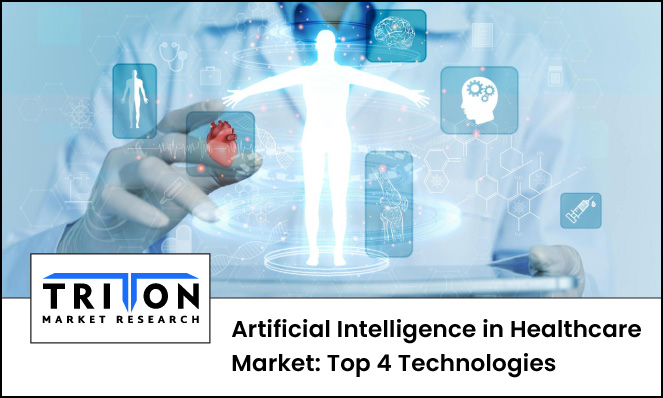



02, April 2024

As per several studies, the volume of healthcare data is doubling every 73 days, highlighting the pressing need for advanced analytical capabilities. AI in healthcare offers a powerful solution, enabling healthcare providers to harness this data deluge and extract valuable insights to improve patient care, enhance operational efficiency, and drive innovation. This growing demand for AI solutions is expected to propel the Global Artificial Intelligence (AI) in Healthcare Market to reach a staggering $34272.19 million by 2032, growing at a remarkable CAGR of 37.14% during the forecast period 2024-2032.
One of the most promising applications of AI in healthcare and research is its growing role in the development of personalized medicine. By examining vast amounts of patient data, including genomic information, medical records, and lifestyle factors, AI algorithms can detect patterns and generate personalized treatment plans. This approach enhances the effectiveness of treatments and minimizes potential side effects, improving overall patient outcomes.
Explore in detail about this market in our FREE sample
At the heart of AI's impact on healthcare lies a suite of cutting-edge technologies, each playing a vital role in transforming various aspects of the market:
Natural Language Processing (NLP): NLP enables artificial intelligence systems to understand and interpret human language, making it invaluable for tasks such as analyzing medical reports, transcribing doctor-patient conversations, and extracting relevant information from unstructured data sources. As per our analysis, NLP leads the technology segment, garnering $8296.22 million in 2023.
Querying Method: This AI technique allows for efficient retrieval and analysis of data from large databases, empowering healthcare professionals to quickly access relevant patient information and make informed decisions.
Besides, querying methods enable the standardization of drug information across different databases and platforms. This standardization ensures that healthcare providers have access to consistent and accurate information regarding drug dosages, formulations, and administration guidelines, reducing the risk of errors due to misinterpretation or outdated information.
Based on type, dosage error reduction is expected to witness the fastest growth at 38.09% during 2024-2032.
Context Aware Processing: By understanding the context in which data is presented, AI systems can provide more accurate and relevant insights, enhancing the reliability of diagnoses and treatment recommendations.
In preliminary diagnosis, artificial intelligence methods can assist healthcare professionals in identifying potential medical conditions by analyzing patient symptoms, medical images, and other data sources. In this regard, IBM Watson Health and Deepmind Health are among the pioneering AI-driven diagnostic solutions.
Deep Learning: This advanced AI technique, inspired by the human brain, enables systems to learn from vast amounts of data, identify patterns, and make predictions with high accuracy. Deep learning is particularly valuable in areas such as medical image analysis and drug discovery. Our estimates indicate deep learning technology to witness the fastest growth at a CAGR of 39.66% during 2024-2032.
Further, deep learning algorithms have proven beneficial in robot-assisted surgery, where they process vast amounts of data from surgical instruments and imaging in real time, enabling robotic systems to make minute adjustments with precision beyond human capability.
In March 2023, Microsoft introduced Dragon Ambient eXperience (DAX™) Express, playing a key role in automating the clinical documentation process.
In October 2023, Google launched new generative AI features to assist in retrieving accurate clinical information, including clinical notes and electronic health records.
IBM unveiled IBM Quantum Heron to deliver its highest performance metrics and lowest error rates in December 2023.
Connect with our experts for a simplified analysis!
The future of AI in healthcare is brimming with exciting possibilities and potential market shifts. One emerging trend is the integration of AI with Internet of Things (IoT) devices, enabling real-time monitoring of patient health and facilitating proactive interventions. Additionally, the adoption of cloud-based AI solutions is expected to gain momentum, providing scalable and accessible healthcare solutions, thereby creating lucrative opportunities for the artificial intelligence (AI) in healthcare market globally.
Explore Our Latest Release for the 2024-2032 Market Analysis
While AI offers numerous benefits, it is essential to address potential risks, such as data privacy concerns, algorithmic biases, and the need for human oversight to ensure ethical and responsible implementation.
Q2: How can AI improve healthcare accessibility and affordability?AI can enhance healthcare accessibility by enabling remote patient monitoring, facilitating telemedicine services, and streamlining administrative processes, ultimately reducing healthcare costs and outcomes.

Prevalent cases of terrorist attacks in today’s world is increasing the need for severe standards of security for public safety, and the global market for biometric technology scrupulously accommoda..
Prevalent cases of terrorist attacks in today’s world is increasing the need for..